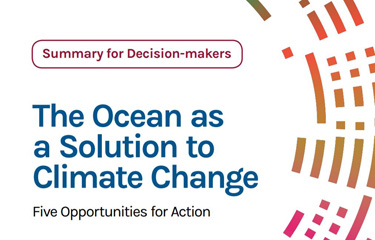Ocean-based solutions can play an important role in the fight against climate change, according to a new scientific report published last week at the United Nations Secretary-General’s Climate Action Summit in New York City, U.S.A.
The report, “The Ocean as a Solution to Climate Change: Five Opportunities for Action,” written by a consortium of scientsts affiliated with the World Resources Institute, begins with the dramatic statement, “The ocean is on the front lines of the battle against climate change.”
With the oceans getting warmer and getting more acidic, coral reefs are dying, the location and size of commercial fish stocks are shifting, and the ocean’s long-term ability “ to provide food, livelihoods, and safe coastal habitation on which billions of people depend” will be jeopardized, the report found.
One of the solutions to minimizing the impacts of climate change mentioned in the report is a switch to of low carbon-sources of protein harvested from the ocean, such as sustainably-harvested seafood, seaweeds, and kelp. Low-carbon sources of protein from the ocean can “help feed future populations in a healthy and sustainable way while easing emissions from land-based food production. The move would result in emission reductions of up to 1.24 gigatons of carbon dioxide (CO2) each year by 2050.
Other ocean-based climate action could reduce the world’s carbon footprint up to one-fifth (21 percent, or 11 gigatons of CO2) of the annual greenhouse gas emissions cuts needed in 2050 to limit global temperature rise to 1.5 degrees Celsius. Recommended actions include
- Protecting and restoring “blue carbon” ecosystems – such as mangroves, seagrasses and salt marshes, which could prevent approximately one gigaton of CO2 from entering the atmosphere by 2050.
- Scaling up ocean-based renewable energy, which could save up to 5.4 gigatons of CO2 annually by 2050, equivalent to taking over a billion cars off the road each year.
- Decarbonizing domestic and international shipping and transport, which could cut up to 1.8 gigatons of CO2 annually by 2050.
Palau President Tommy Remengesau Jr., who co-led the High‐Level Panel for a Sustainable Ocean Economy Meeting in New York, said climate change poses a danger to the oceans and in several nations, such as his, people look into the ocean for their livelihood.
“The world can’t lose sight of the ocean in our climate change response,” he said in a statement. “In Palau, ocean and human vitality are interwoven in our history and culture: we’re a testimony to how the ocean and climate are inextricably linked and connect us all.”
Remengesau Jr. said he was happy to see some solutions laid out in the new report, but said they were useless if not implemented. He asked leaders of other countries to “work with, and not against the ocean.”
“Doing so will protect the most vulnerable nations, like ours, from the full force of the climate crisis,” he said. “This untapped potential provides hope. Humanity must seize it.”
Some countries have already made ocean-based climate action commitments. Fiji is committing to making its shipping sector 100 percent carbon-free by 2050, while Japan will promote demonstration projects geared towards early commercialization of marine renewable energy. Kenya will incorporate blue carbon ecosystems into its nationally determined contribution, in partnership with The Pew Charitable Trusts and WWF, while Mexico will put in an additional 31 fishing refuge areas, bringing more than 100,000 hectares that are under sustainable management. Namibia will invest USD 5 million (EUR 4.5 million) towards ocean research and protection over 2019/2020.
Meanwhile, Norway will cut 50 percent of its emissions from domestic shipping and fishing vessels by 2030, and Portugal is committing to produce 10 percent of its electricity by floating offshore wind and wave energy by 2030. And Australia is investing in the Blue Economy Cooperative Research Centre (CRC), an AUS 329 million (USD 227.4 million, EUR 204.3 million) research project supporting renewable energy, sustainable seafood, and offshore engineering projects, which will be implemented by a team of University of Queensland researchers and 40 other organizations to form a new cooperative research center.
Australia Prime Minister Scott Morrison said a healthy ocean is essential to livelihoods, security, and sustainability of the people.
“Australians, along with our Pacific family, are coastal people, and the Australian government is committed to ensuring the long-term health of our shared ocean,” he said in a statement.
Private corporations and organizations have also made marine-focused pledges to reduce carbon emissions via the Getting to Zero Coalition, which was launched last year with the goal of converting all vessels operating along deep sea trade routes to zero-emission ships by 2030.
In the seafood industry, the Chilean salmon aquaculture association SalmonChile announced last year its aim to reach 50 percent carbon neutrality by 2020. Its member company Salmones Camanchaca went further, vowing to be 100 percent by 2025.
Only one seafood company globally is currently carbon-neutral: Mt. Hawthorn, Western Australia, Australia-based Austral Fisheries, which attained carbon-neutral status in 2016.







